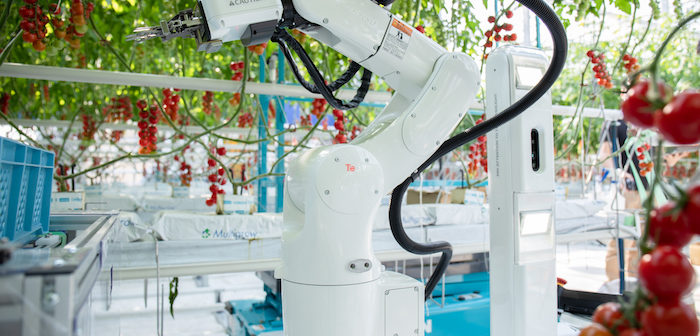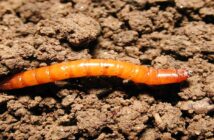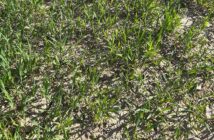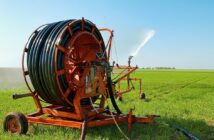Robots traditionally used in vehicle production could be used to grow and pick a greater volume of tomatoes in Europe.
The Harvest Robot is a new piece of agri-tech that makes it possible to grow and pick fruit such as tomatoes with less human intervention. The robot detects, cuts and transports tomatoes to crates all by itself. Furthermore, thanks to its deep learning technology, it has the potential to become more intelligent each time it is used, scouting yields and measuring the climate and health of crops, using data to warn against potential viral infections and ensure higher yields.
The intelligent machine is the result of a collaboration between robotics manufacturer DENSO and greenhouse solutions specialist Certhon. Already trialed in Asia, the Harvest Robot can form part of an autonomous agricultural system with technology providing the optimal temperature and climatic conditions to grow crops, assisted by robots monitoring, picking and packaging up fruit. Such systems, now being focused on the European market, have the potential to revolutionize the entire food supply chain, making it more sustainable, more reliable, and more efficient in the process.
The Harvest Robot is modelled on DENSO’s range of robotics and automation solutions typically used in industrial scenarios such as auto-part manufacturing. Furthermore, the company’s thermal systems – most commonly seen within vehicle air conditioning and radiator systems – are being used to control greenhouse temperatures to create conditions in which crops can grow and the robot can perform its duties, without being affected by weather conditions. DENSO’s partnership with Certhon enables it to evolve its technologies together with Certhon’s advanced horticultural techniques and cultivation knowledge.
DENSO has a long history of technologies originally developed for manufacturing and the automotive sector that have made their way into other industries. Using creativity to maximize technological innovations to solve one of the world’s problems, DENSO’s technological ideas range from using robots for planting and picking crops, to using artificial intelligence to help understand data and improve yields. With this technology, we can accelerate agriculture by increasing food productivity using less space and less amounts of water.
Combatting the effects of climate change
The impact of climate change also presents challenges for global food production. With increasingly volatile climate conditions and continued population growth, there is a vital need for sustainable solutions which can help to feed the planet and overcome the increased demands placed on food production as a result of ever-challenging growing conditions. Such solutions, drawing on next-generation technologies from the world of automotive, may hold the key.
Making enough safe and fresh produce accessible to a growing global population, in a way that is environmentally friendly and sustainable, is one key challenge of our time. As food production becomes more challenging, truly creative solutions will become crucial.
Through this groundbreaking collaboration, unrivalled expertise in robotics, big data, and process management, come together to redefine the world of food production and achieve a fully sustainable food supply chain that can deliver at scale in the most efficient and secure way possible.




